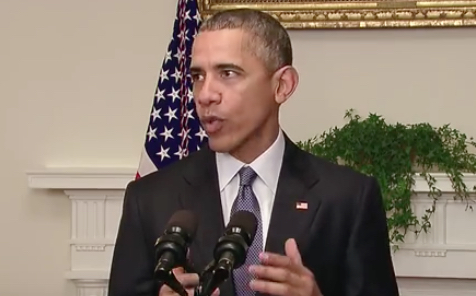
President Barack Obama praises the international agreement reached in December to shift the world away from fossil fuels. Obama’s Clean Power Plan is at the heart of the U.S. pledge to reduce pollution in that global pact.
By Bill Dawson
Texas Climate News
Texas officials won at least a temporary legal victory in their fight against federal regulations to protect the climate on Tuesday when the Supreme Court halted implementation of the Obama administration’s Clean Power Plan while litigation opposing it proceeds.
The sweeping regulatory effort by the Environmental Protection Agency aims to slash climate-changing pollution from power plants, greatly reducing the nation’s use of coal, the most polluting fuel, to make electricity.
Texas and West Virginia are leading a group of 29 states and state agencies, allied with a number of companies and business groups, seeking to kill the Clean Power Plan through legal action. Houston is part of a group of cities and municipal organizations that are siding with 18 states and various organizations in support of the plan in the courts.
The Clean Power Plan is the centerpiece of President Barack Obama’s efforts to fight global warming and the major element in the U.S. pledge to reduce greenhouse-gas emissions in the international climate agreement that nearly 200 nations reached in Paris in December. The pact, in which nations made voluntary emission-cutting promises, launched an unprecedented effort to shift the world away from fossil-fuel use and thereby prevent the worst impacts of manmade climate change projected by scientists.
The EPA rules require states to develop individual plans to reduce heat-trapping carbon emissions from power plants by about a third through actions such as substituting natural gas (cleanest burning of the fossil fuels), renewables and energy-conservation measures for the use of coal in the production of electricity.
Texas Attorney General Ken Paxton hailed the Supreme Court’s 5-4 action on the state-led lawsuit in a statement:
This is a major victory for Americans who feared the loss of their jobs, not to mention anyone concerned over the potential of skyrocketing electric bills and the overall quality of our electric grid. The Obama Administration clearly exceeded its authority in imposing this plan, which would cost taxpayers and consumers alike hard-earned money in exchange for less-reliable service.
Vickie Patton, general counsel of the Environmental Defense Fund (EDF), a national advocacy group that is a party to the case and has a major presence in Texas, also issued a statement:
Today’s court decision is unfortunate but does not reflect a decision on the merits. The [U.S. Court of Appeals for the D.C. Circuit] will carry out a careful and expeditious review of the merits over the next few months. The Clean Power Plan has a firm anchor in our nation’s clean air laws and a strong scientific record, and we look forward to presenting our case on the merits in the courts. EDF believes the merits phase of the case can be argued, and decided, quickly – while Americans in red and blue states alike work together to protect our families and communities from the clear and present danger of climate change.
In contrast with that hopeful outlook on the possibility of a quick ruling, a press release from Paxton’s office declared that a final ruling from the D.C. Circuit Court “might not come for months” after it hears oral arguments on the merits of Texas’ and the other states’ lawsuit on June 2.
The Supreme Court’s order blocking the Clean Power Plan specified that the halt will remain in force until the high court rules on the case, if a decision by the D.C. Circuit Court is appealed to the justices and they decide to hear the appeal.
A three-judge panel of the D.C. Circuit Court unanimously refused in January to grant the stay of the regulations that the states sought and the Supreme Court has now issued.
The stay may signal bigger trouble ahead for the power-plant regulations. The New York Times reported that the Supreme Court had never previously halted regulations before an appellate court review was complete.
“It’s a stunning development,” Jody Freeman, a Harvard law professor and former environmental legal counsel to the Obama administration, said in an email [to the Times]. She added that “the order certainly indicates a high degree of initial judicial skepticism from five justices on the court,” and that the ruling would raise serious questions from nations that signed on to the landmark Paris climate change pact in December.
Under the Clean Power Plan, Texas and the other states are supposed to submit their initial emission-cutting plans by September or request a two-year extension for plan submission. A first phase of emission reductions is required by 2022 and full compliance by 2030.
Texas officials have argued, as Paxton did again on Tuesday, that the Clean Power Plan would hurt the state economically and jeopardize its electric-system reliability. EDF has countered that Texas has already made major strides toward compliance and “easily can fill the remaining gap with a handful of thoughtful policy changes, as long as policymakers do not undermine current market trends.”
+++++
Bill Dawson is the founding editor of Texas Climate News.
